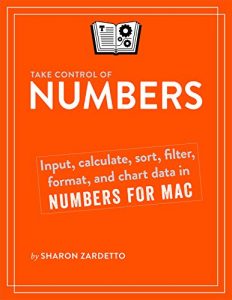Get serious with Numbers, Apple's powerful spreadsheet for the Mac!
Apple's Numbers has become a grown-up spreadsheet (and it's free on every Mac sold since October 2013!), but many of us still haven't learned even the basics, much less been able to take advantage of its surprisingly deep collection of features.
With the advice in this 330-page ebook, you'll learn to input, calculate, sort, filter, format, and chart your data with ease, as author Sharon Zardetto guides you through the basics all the way to power-user features like conditional highlighting, custom data formats, and star ratings. Richly illustrated with hundreds of annotated screenshots, the ebook also includes a hands-on example spreadsheet you can use to try what you're learning, plus a special tutorial chapter that helps you put it all together. Of course, you can also treat the book as a reference, using the Quick Start to focus on a topic of interest.
The book covers Numbers 3.5, which works on any Mac running OS X 10.10 Yosemite.
You'll learn how to...
Handle the basics:
- Input data into a table.
- Choose the best chart type for your data.
- Add, modify, and position shapes, such as arrows, comments, and text boxes.
- Import/export from Excel, text, CSV, and older versions of Numbers.
- Set up page numbers and other header/footer information for printing.
See what you want to see:
- Know what to expect when you sort by column.
- Hide and show columns.
- Merge and unmerge cells.
- Create rules that filter data to display only specific rows.
- Set up and view interactive charts.
Make formulas:
- Work fluidly in the formula editor to create formulas.
- Make formulas from the tear-off tokens on the Quick Calc bar.
- Nimbly use various types of cell references in formulas.
- Understand how to use IF, TRUE, and FALSE in formulas.
- Take charge of logical operators (AND, OR, NOT) in formulas.
- Concatenate and break apart text.
- Strip extra spaces out of data.
- Find medians, modes, ranks, percentiles, and more.
Create clever formulas that can:
- Calculate a sales discount based on whether a total is over or under a certain amount.
- Sort seemingly unsortable data, such as items described as Poor, Good, or Excellent.
- Take a column of cells, with each cell containing a full name, and move all the last names into a different column.
Apply formatting:
- Add and remove grid lines and cell borders.
- Work with a cell's background fill.
- Format a chart so it looks fabulous.
- Set up conditional highlighting that appears only when data meets certain criteria.
- Ensure accurate data entry with cell formats like sliders, menus, and checkboxes.
- Use and create templates.
- Format faster with character, paragraph, list, shape, and table styles.






